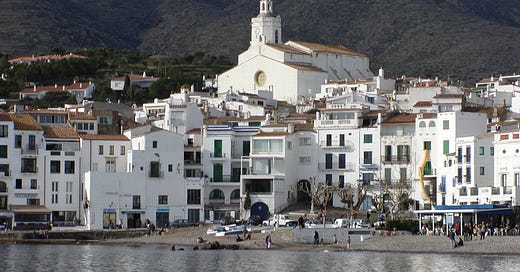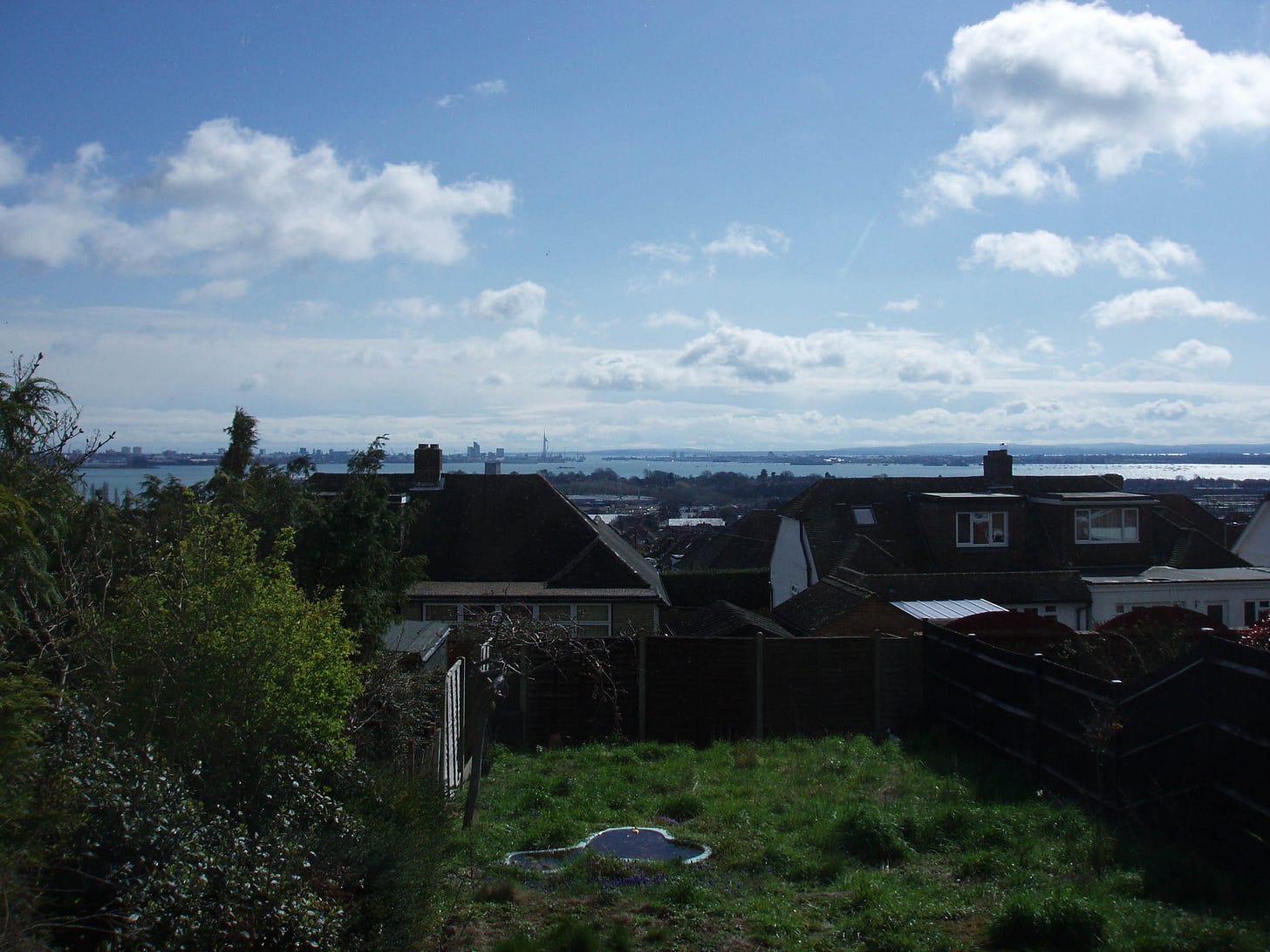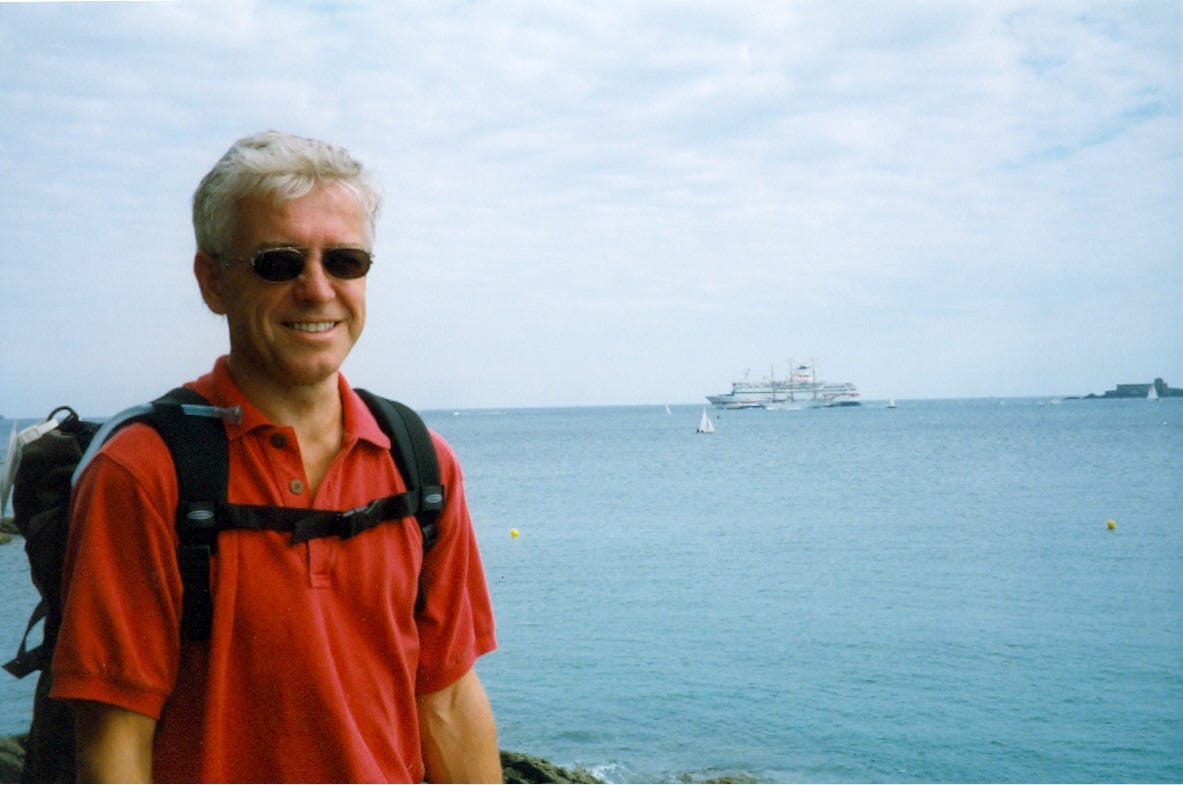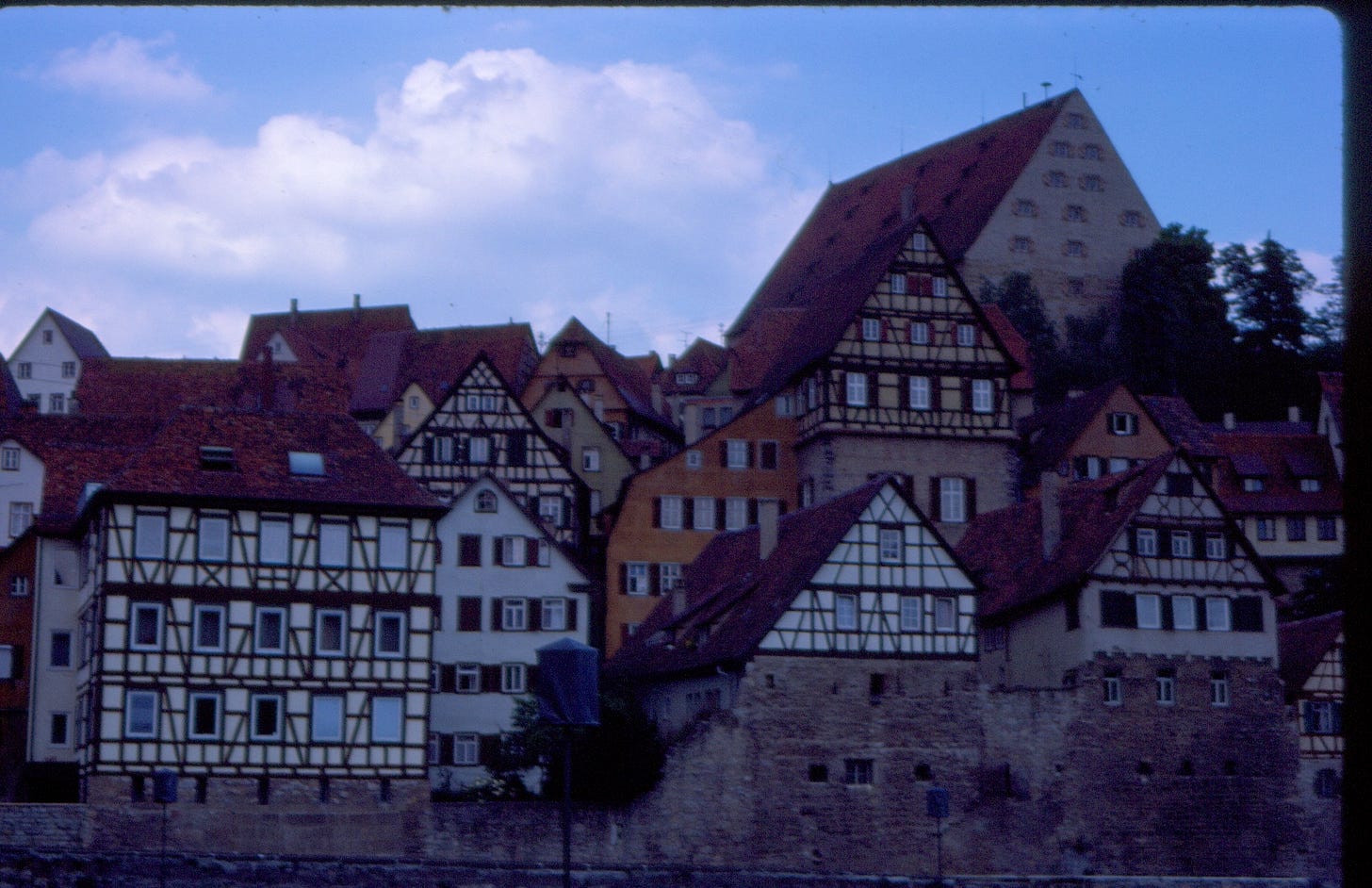Today's post is inspired by
's essay A Life Shaped by Five Languages, in turn inspired by ’s essay Different Emotions in Different Languages. Thank you, Monica, for the dare! I'd like to tell you about my experience with five-and-a-half languages, which I'll cover in the order I found them, illustrated by some grainy pictures from before digital photography!English
I grew up in the south of England, and I was aware from a very early age of dialects and accents. My parents were originally from Yorkshire in the north. They still had the accent but had dropped most of the dialect in the interests of intelligibility. I'd hear it unfiltered on trips north to visit the relatives. Many of our neighbors spoke with the unique and characteristic accent, a mixture of Cockney and country yokel, of the nearby Navy town of Portsmouth.
Accent in the UK has always been a marker of class, something that the upwardly mobile would try to lose. The ideal is to speak in received pronunciation, better known as the King's English or BBC English, although recently broadcasters with regional accents have been tolerated outside of the safe zone of sports. If my American readers are seeing parallels with race in US, you are not mistaken.
In high school, I'd switch accents depending on the friend group I was with. I went to university in Manchester, where most of my friends were from across the Pennines in Yorkshire, and quickly wrapped myself in my parents' accent, which we wore as a marker of solidarity with the working-class.
The ability to match my accent to my conversation partner stood me in good stead in learning other languages. It hasn't worked in the US, though. After almost 40 years here, my accent remains stuck in the middle of the Atlantic. Although it moves a few thousand miles east every time I talk to Brits, they still hear me as American and Americans still hear me as a Brit, although I'm occasionally asked if I'm Australian. Everywhere I go now, I have an accent. Wherever I am, I'm not from around here. Technically a dual citizen, I'm really a perpetual immigrant, a melting pot of cultures, a permanent resident of nothing but planet Earth. And I'm OK with that.
English is the language I (mostly) think, dream, listen and speak, read and write in, and the language through which I interpret the world. Each dialect and accent, though, brings with it its own subtle shift in perspective. English is, like all those I cover here, a language of colonization, and as a result, has dialects and accents around the globe. Indian English, for example, has more speakers that British English. It's a joy to be able to read them here on Substack.
French
Twenty-five years ago, my wife and I took a ferry from my old school’s town of Portsmouth to St Malo in France for our honeymoon. Twenty-five years before my school days, troops took rather different ships from Portsmouth to Normandy for D-Day. For us in school, France was years and miles away, in Portsmouth's past but not yet in its future.
In the nine years of French I somehow managed to have in school, it was taught very much like Latin; a language that you'll never have to use. We learned more through reading, writing, and translating than speaking. Aptly, we learned more about the past and future tenses than the present. After nine years, I could read Candide, but not a newspaper; a conversation would have been out of the question.
It would be another dozen years until I would visit France for the first time. I was happy to find that I could read things! Moving to Holland brought a Belgian French language TV station and the possibility of learning to follow spoken French. My wife speaks fluent French, so France for our honeymoon was a natural fit. We were quite the double act in France, as my wife never really learned the written language, while I struggled to speak it. I'd read the menu; she'd speak to the waiter! We've been back several times and are looking forward to spending more time there in the coming years and recovering our rusty French.
The histories of France and Britain have been intertwined for a thousand years, including in their adventures in North America, and they still are. Brexit notwithstanding, we'll always be family, and like family, French for me comes with a lot of baggage!
Latin
Latin is the half in the five-and-a-half.
For five years, we also studied Latin. Why? Well, at the time, Oxford and Cambridge universities required Latin and Greek for admission, in retrospect a clear example of class-based gatekeeping. On the off chance that some of us might be in the running, we learned some Latin, enough to read, for example, Julius Caesar's Gallic Wars, an autobiographical hagiography in which he refers to himself in the third person, an early example of narcissistic personality disorder. The book made me sympathetic to the French!

Latin reenters the story a few languages down.
German
At the ripe old age of thirteen, we had to make a future career choice. Languages, or science? We could either choose languages, adding German to even more French, or science, with physics and chemistry instead. Although relatively proficient at French, I went with science.
A gap in the curriculum meant some of us got a year of German anyway. In hindsight, I think they just had a surplus of German teachers. We didn't learn much in a year, but it did give me a slight leg up on learning the next one, Dutch.
My time in Holland gave me another opportunity to learn German. Dutch and German share some words and grammar; we had three German TV stations; and there were incentives, as our largest customers were in Germany, and Cologne was only two hours away. By the end of my time in Holland, I could read and understand German easily and speak well enough to hold up my end of a phone conversation.
Visiting a few years ago after a thirty-year gap, I found that while I could still read German well, and even understand it spoken, if I tried to speak, it came out as Dutch! German has been mostly a language of business for me, always associated with my corporate life. I appreciate its order and rules, but I find it hard to warm to.
Dutch
Forty-five years ago, I moved to Holland, and immediately set about learning Dutch. It took a while, not because it's a particularly hard language, but because every time I tried to speak, people would answer in English. It took six months until I was able to get people to answer in Dutch. We lived in 's-Hertogenbosch, or Den Bosch for short, a town with a strong regional accent and identity, and I picked up the accent to an extent that people in other parts of Holland just assumed I was from there.
The accent, dialect, and culture have much in common with Flemish and Flanders, just across the border in Belgium. They share the "soft G", not the much harder G of northern Holland. The vibe is also softer, much more laid back.
After six years there, I was functionally bilingual and bicultural. I had developed a real affection for the language and its unique cultural expressions. I was back there in 2004, and was disappointed, but not altogether surprised, to find that, while I could still speak Dutch, the accent had gone. People would once again answer me in English!
Dutch will always be part of me; not just the language, but the open, progressive, fair-minded, worldview that it expresses so well, even as that is under assault at home.
The culture shock of my next move, to nineteen-eighties New Jersey, hit hard.
Spanish
When I moved to Holland in 1979, Franco had been dead just four years, and it would be another seven before Spain would join the EU. Spain was just a place where migrant workers came from. Migrant workers and my boss, that is, on a temporary work placement from our Barcelona office. He asked me to go there to visit some customers.
Out to dinner with colleagues from the Barcelona office, I noticed that while they were conversing in Catalan, which had been suppressed under Franco, when they looked at the menu, it was the Spanish side rather than the Catalan. They'd never learned to read their own language. I fell hard for Barcelona right there. I saw clearly, perhaps for the first time, the essential connection between language and culture; that those who would destroy a culture start by destroying its language.
Many years later, I had the opportunity to visit Costa Rica. Although it would only to be for a week, I was determined to learn at least a little Spanish. Oh, yes, that Latin? It helped! Of current languages, Spanish is the closest to Latin. I learned and heard enough to want more, and actually took a class for the first time since high school.
Spanish is a phonetic language. What you see is what you get. The way its written tells you how it sounds, and the way it sounds tell you how its written, in contrast to, say, French. A consequence is the more proficient I became at reading the more I could "hear" the words on the page. Reading in Spanish opened up an immense world of literature for me. I worked my way up from Isabel Allende to Gabriel García Márquez' Cien Años de Soledad (One Hundred Years of Solitude).
Coming full circle, in 2002 we spent Christmas in Barcelona. On New Year's Day, 2003, I figured I'd buy a book in Spanish. After all the books on quitting smoking, the next best seller was La Sombra del Viento (The Shadow of the Wind) by Carlos Ruis Zafón. It turned out to be one of my favorites of all time.
I've enjoyed languages, even loved a few, but I've never fallen for one as I did for Spanish.
I'm grateful for the doors languages have opened for me. May they open many more.
Thanks, as always, for reading, or listening.










Beautiful journey that intertwines your travels and residences with languages. They do open up new worlds, cultures and literature, don't they?
Also, I really like this phrase: "Everywhere I go now, I have an accent." It's such a true by-product of learning multiple languages, it all gets mixed together sometimes in the head.
What a wonderful life. Accents function very similarly in New England as they do in England, which I guess is not very surprising. Very much a mark of social class. This piece put me in mind of a gorgeous song called Big Yellow Moon, by Kaiti Jones, in which she sings, "Everywhere I go, I from somewhere else. Can't you tell by the way I bend my mouth?" She's from my hometown, so the back cove she remembers is the one I remember, too. But I think it's a song that would speak to anyone who has felt like an outsider, or felt like the place they most belonged was far away. Thanks for lovely read.